人教版初中英语 中考一轮复习 名词和冠词 课件 (共45张PPT)
文档属性
| 名称 | 人教版初中英语 中考一轮复习 名词和冠词 课件 (共45张PPT) |  | |
| 格式 | ppt | ||
| 文件大小 | 1015.5KB | ||
| 资源类型 | 教案 | ||
| 版本资源 | 人教新目标(Go for it)版 | ||
| 科目 | 英语 | ||
| 更新时间 | 2023-06-21 17:59:48 | ||
图片预览

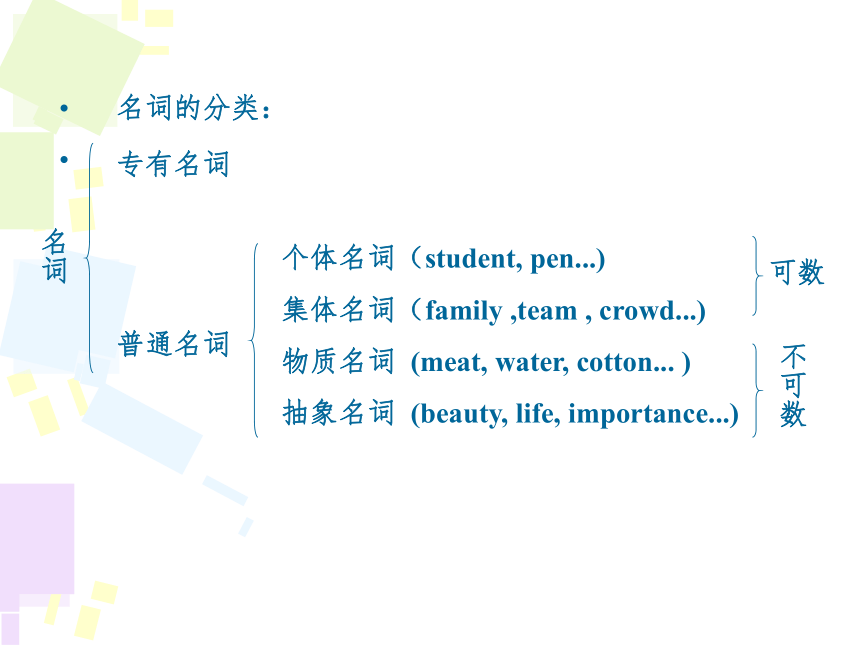
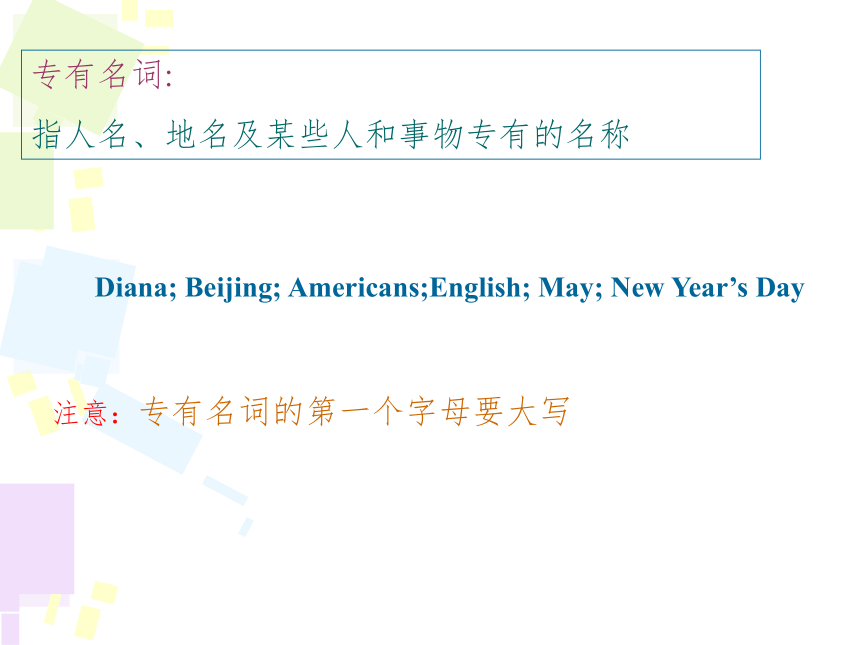
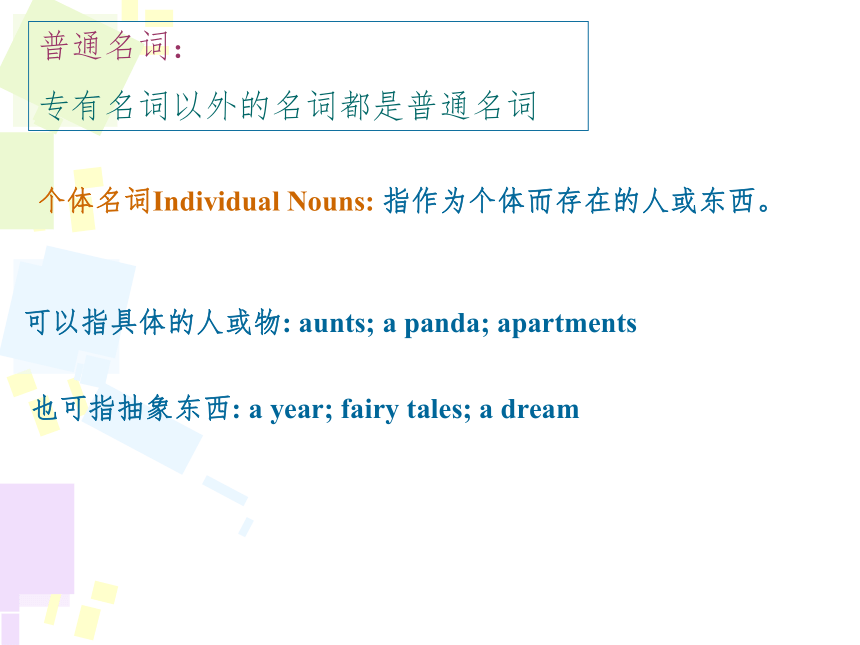

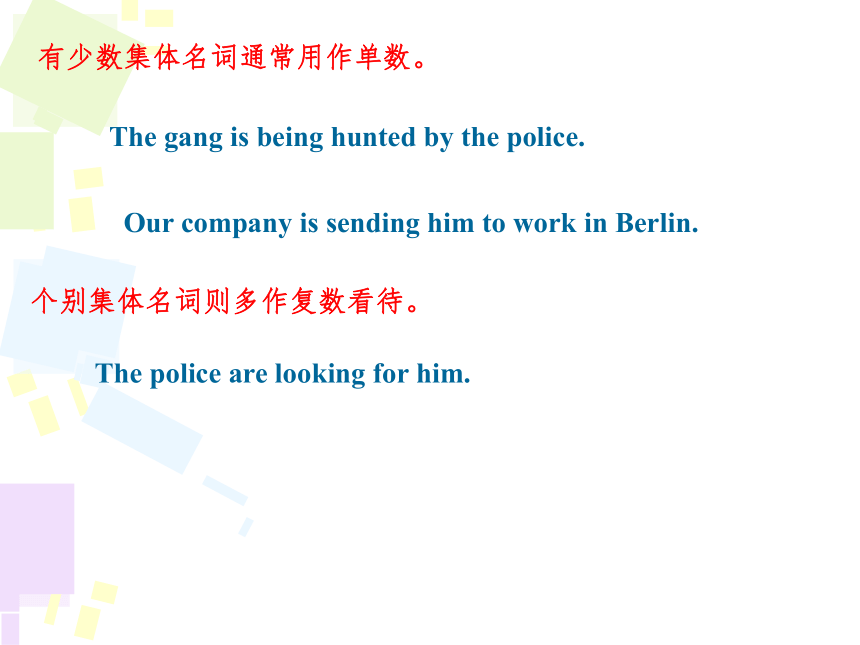
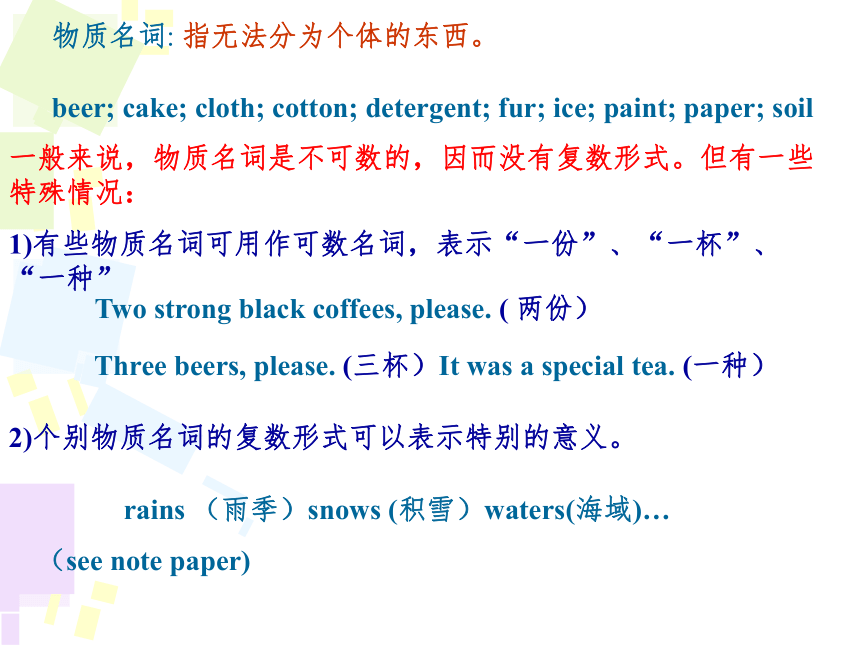
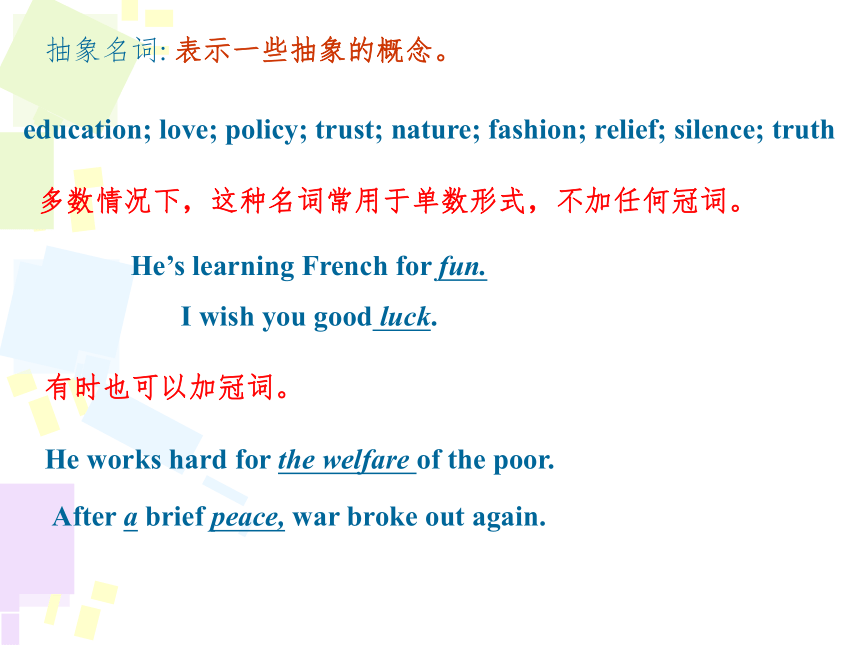
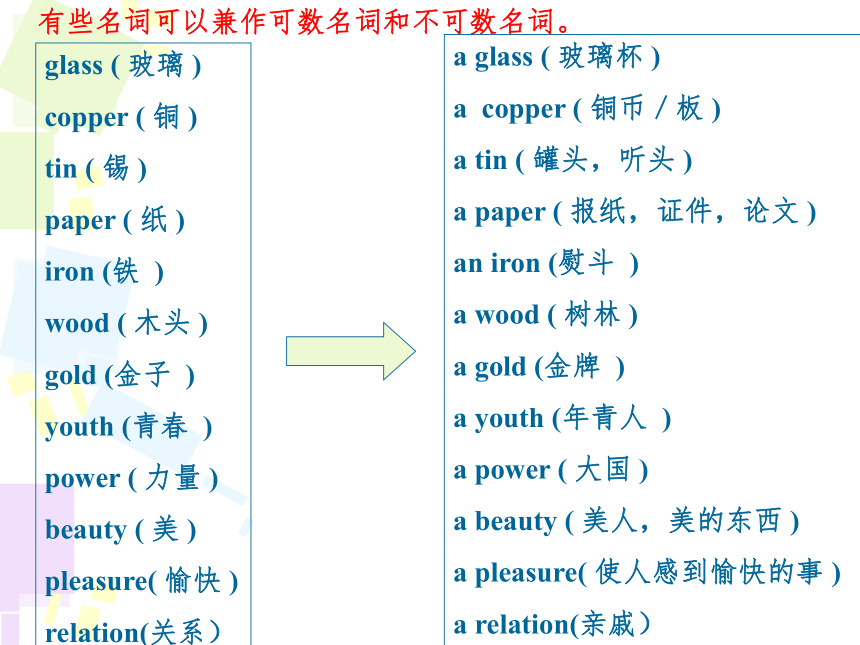
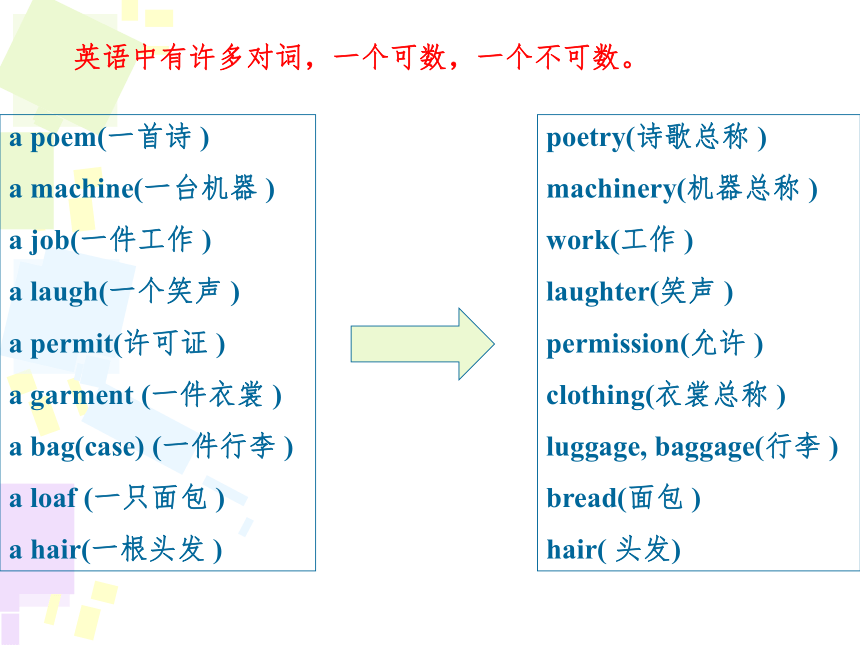
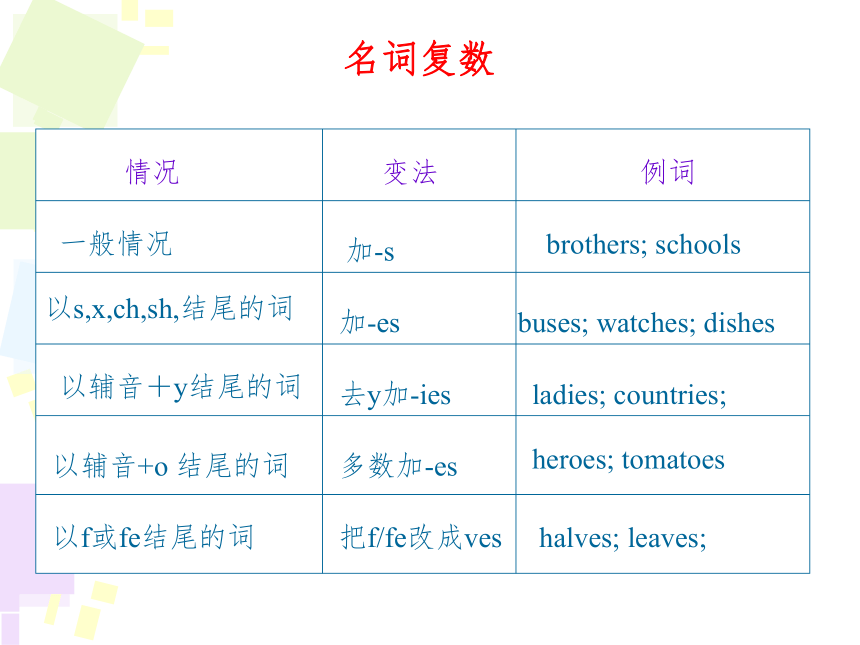
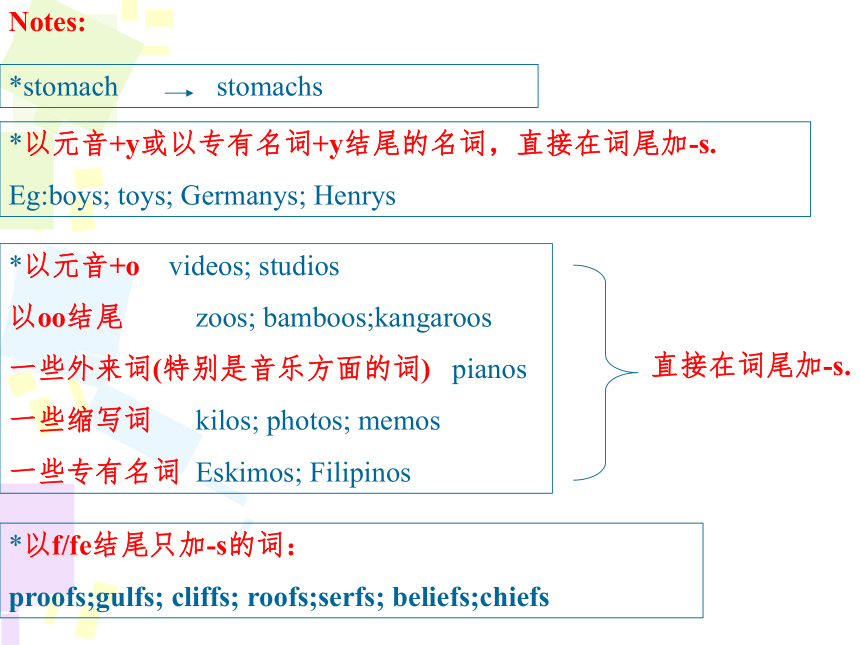
文档简介
(共45张PPT)
名词
名词的分类:
名词
专有名词
普通名词
个体名词(student, pen...)
集体名词(family ,team , crowd...)
物质名词 (meat, water, cotton... )
抽象名词 (beauty, life, importance...)
可数
不可数
专有名词:
指人名、地名及某些人和事物专有的名称
Diana; Beijing; Americans;English; May; New Year’s Day
注意:专有名词的第一个字母要大写
普通名词:
专有名词以外的名词都是普通名词
个体名词Individual Nouns: 指作为个体而存在的人或东西。
可以指具体的人或物: aunts; a panda; apartments
也可指抽象东西: a year; fairy tales; a dream
集体名词: 表示由个体组成的集体。
army; audience; crew; family; team; police; government; public
集体名词有时作单数看待,有时作复数看。一般来说,视为整体时作单数看,突出它的成员时作复数看。
His family isn’t large.
His family are all music lovers.
在不少情况下,集体名词后单复数动词都可以用,没什么差别。
The audience was (were) excited by the show.
有少数集体名词通常用作单数。
The gang is being hunted by the police.
Our company is sending him to work in Berlin.
个别集体名词则多作复数看待。
The police are looking for him.
物质名词: 指无法分为个体的东西。
beer; cake; cloth; cotton; detergent; fur; ice; paint; paper; soil
一般来说,物质名词是不可数的,因而没有复数形式。但有一些特殊情况:
1)有些物质名词可用作可数名词,表示“一份”、“一杯”、“一种”
Two strong black coffees, please. ( 两份)
Three beers, please. (三杯)
It was a special tea. (一种)
2)个别物质名词的复数形式可以表示特别的意义。
rains (雨季)snows (积雪)waters(海域)…
(see note paper)
抽象名词: 表示一些抽象的概念。
education; love; policy; trust; nature; fashion; relief; silence; truth
多数情况下,这种名词常用于单数形式,不加任何冠词。
He’s learning French for fun.
I wish you good luck.
有时也可以加冠词。
He works hard for the welfare of the poor.
After a brief peace, war broke out again.
有些名词可以兼作可数名词和不可数名词。
glass ( 玻璃 )
copper ( 铜 )
tin ( 锡 )
paper ( 纸 )
iron (铁 )
wood ( 木头 )
gold (金子 )
youth (青春 )
power ( 力量 )
beauty ( 美 )
pleasure( 愉快 )
relation(关系)
a glass ( 玻璃杯 )
a copper ( 铜币/板 )
a tin ( 罐头,听头 )
a paper ( 报纸,证件,论文 )
an iron (熨斗 )
a wood ( 树林 )
a gold (金牌 )
a youth (年青人 )
a power ( 大国 )
a beauty ( 美人,美的东西 )
a pleasure( 使人感到愉快的事 )
a relation(亲戚)
英语中有许多对词,一个可数,一个不可数。
a poem(一首诗 )
a machine(一台机器 )
a job(一件工作 )
a laugh(一个笑声 )
a permit(许可证 )
a garment (一件衣裳 )
a bag(case) (一件行李 )
a loaf (一只面包 )
a hair(一根头发 )
poetry(诗歌总称 )
machinery(机器总称 )
work(工作 )
laughter(笑声 )
permission(允许 )
clothing(衣裳总称 )
luggage, baggage(行李 )
bread(面包 )
hair( 头发)
名词复数
情况
变法
例词
一般情况
以s,x,ch,sh,结尾的词
以辅音+y结尾的词
以辅音+o 结尾的词
以f或fe结尾的词
加-s
加-es
去y加-ies
多数加-es
把f/fe改成ves
brothers; schools
buses; watches; dishes
ladies; countries;
heroes; tomatoes
halves; leaves;
Notes:
*stomach
stomachs
*以元音+y或以专有名词+y结尾的名词,直接在词尾加-s.
Eg:boys; toys; Germanys; Henrys
*以元音+o videos; studios
以oo结尾 zoos; bamboos;kangaroos
一些外来词(特别是音乐方面的词) pianos
一些缩写词 kilos; photos; memos
一些专有名词 Eskimos; Filipinos
直接在词尾加-s.
*以f/fe结尾只加-s的词:
proofs;gulfs; cliffs; roofs;serfs; beliefs;chiefs
不规则复数:
1.man
men
woman– women; chairman-chairmen
2.oo
ee
foot-feet; tooth-teeth; goose-geese
3.+en
child-children; ox-oxen
4.ouse
ice
mouse-mice; louse-lice(虱子)
有些外来词的不规则复数形式:
Eg: analysis-analyses; basis-bases; thesis-theses; crisis-crises
criterion-criteria; phenomenon-phenomena; medium-media
单复数相同的情况:
sheep; deer; means; fish; works; species; Chinese;Japanese
以及由汉语音译表示度量衡、货币等单位的名词。
Eg: yuan,jiao,fen, jin
复合名词的复数形式:
1.词末+-s film-goers ; forget-me-nots
2.主体名词变为复数形式:lookers-on; editors-in-chief;sons-in-law
3.两个组成部分皆变为复数:women doctors; men cooks* 这种形式的第一个名词必须是man或woman
通常用于复数形式的词
scissors剪刀; pants裤子; contents目录
compasses两脚规; cords灯心絨裤; arms武器
earphones耳机; pyjamas睡衣裤; ashes灰烬
scales天平; overalls工装裤; tropics热带
spectacles眼镜; braces背带; stairs楼梯
nail-clippers指甲刀; slacks便装裤; brains头脑
belongings所有物; savings积蓄; tidings消息
doings行为; writings作品; findings调查结果
表示名词的所有关系,翻译为“……的”
名词所有格
形式 使用场合及构成方法 举例
加 ’s 单数 a girl’s bag Jim’s room
不以 S 结尾的复数 men’s room children’s school
加 s’ 以 S 结尾的复数 students’ bike
最后加 ’s 两人共有的一件东西 He is Tom and Mary’s father.
(两兄妹同一个父亲)
同时加’s 两人各自的东西 They are Tom’s and Mary’s father.
(两人不同一个父亲)
用在有生命的名词后
表示时间、距离等的名词所有格
today’s work 今天的工作
two weeks’ holiday 两星期的假期
ten minutes’ walk 走路十分钟的路程
表示 “某人的家” 或 “某种店铺、诊所等等”
to my aunt’s 去舅妈家
at the doctor’s 在诊所
表示 无生命事物的名词所有格
a map of the world
the windows of the room
A of B : “B的A”
名词双重所有格
a friend of my father’s
a picture of mine
名词+of +所有格/名词性物主代词
例1 下列几组复数名词中,每组都有一个错词,请指出:
1. A.Chinese B. Frenchmen C. Englishmen D. Germen
2. A. tomatoes B. photos C. radioes D. potatoes
3. A. desks B. Americans C. friends D. breads
4. A. stories B. families C. plays D. keies
5. A. leaves B. knives C. rooves D. shelves
6. A. clothes B.monthes C. mouths D. fifths
用括号中所给词的适当形式填空:
1.The two girls are ( Japan ) .
2. The ( baby ) are asleep .
3. Do you know the two ( man teacher )
4. The ( child ) are washing their ( foot ) .
5.There are two ( people ) and lots of ( sheep ) in the fields .
6. September 10 is ( teacher ) Day .
7. I think physics ( be )more interesting than maths .
8. Don’t you think the ( radio ) are too noisy
9. Whose ( knife )are these
10. “ Whose house is this ” “ It’s the ( Smith )” .
Japanese
babies
sheep
people
children
feet
men teachers
Teachers’
is
radios
knives
Smith’s
1.The rich_________not always happy.
A.are B.is C.have D.has
2.In Britain,_________are all painted red.
A.letter boxes B.letters boxes
C.letter box D.letters box
3.There are four_______and two________in the group.
A.Japanese,Germen B.Japaneses,Germen
C.Japanese,German D.Japanese,Germans
4.She was born in Wuhan,but Beijing has become her second_________.
A.home B.family C.house D.country
5.Mother brought me_________.
A.a good news B.a piece of news
C.many good news D.two news
训练
A
A
D
A
B
6.March 8th is _________Day.
A.Woman's B.Women's C.Womans' D.Women
7.We can do the work better with______money and
________ people.
A.less,fewer B.fewer,less
C.little,little D.few, few
8.There are three_________in our class.
A.Zhou's B.Zhous C.Zhous' D.Zhous's
9.It's about ten_________walk.
A.minute's B.minutes'
C.minute D.minutes
10.This room is_________.
A.Bill and David's B.Bill's and David's
C.Bills and David's D.Bill and David
训练
(B)
(A)
(B)
(B)
(A)
编辑ppt
11.Beijing is one of the most beautiful_________in China.
A.city B.cities C.citys D.the cities
12.Would you like_________
A.some more meat B.any more meat
C.many more meat D.more much meat
13.—What can I do for you, sir
—I'd like two_________.
A.bottle of milk B.bottles of milks
C.bottles of milk D.bottle of milks
14.Tom's car is more beautiful than_________.
A.his brother's and sister
B.his brother and sister
C.his brothers and sisters
D.his brother's and sister's
15.“Nightingal Prize”is for_________.
A.workers B.scientists C.doctors D.nurses?
训练
B
A
C
D
D
编辑ppt冠词
冠词
不使用冠词
定冠词
不定冠词
a
an
the
零冠词
什么时候使用冠词?
单数可数名词前一定要用冠词。
复数可数名词、不可数名词两可,意义有别。
固定搭配或名词新意
a (n) 作用
泛指单一、每一、任一
指类别
the 作用
特指:
上文提到过的事物
被修饰语限定的
说话双方所默认的
世界上独一无二的
指类别
零冠词 作用
泛指的一些事物
指类别
使用不定冠词的特殊情况
(1)用于抽象名词前:
a good understanding of ; a population of ; a history of; a collection of ; an area of ; a distance of, a length of
(2)用于形容词修饰的“一日三餐”前:
a light breakfast; a big dinner; a quick lunch…
(3)在有或没有形容词修饰的季节、日期前,泛指:
The accident happened on a Sunday in July.
It was a very cold April.
(4)指不具体的任何物: A Mr. called you just now.
(5)相当于per “每一” 的意思:
His income is one thousand yuan a month.
(6) 用于有good/great many修饰的名词复数前:
He visited the Great Wall a good many times.
(7)用于形式为复数,但意义仍为单数的名词前:
Reading is a means of learning.
(8)用于与动词同型的名词前:
Let’s have a walk and a talk at the same time.
(9) 在and连接的两个名词前,用一个a(n)和用两个意义不同:
He went to see a teacher and (a) writer.
(10) 与 of 连用, 表示“同一的”、“相同的”:
of a kind 同一种; of an age 同岁 ;of a size 大小相同
(11)在固定词组中:
a few, a little , a lot of, a bit
in a hurry , in a word
have a good time
do sb. a favor
as a rule
have a word with sb.
make a living
take a bath
have a cold (fever, headache)
many a student ………
使用定冠词the的特殊情况
(1)世界上独一无二的天体、河流、海洋、湖泊、山川等与地理知识有关的名词前使用the :
As we know, the earth moves around the sun.
The Pacific Ocean is the largest in the world.
(2) 发明的事物名称前或或濒临灭绝的动物单数名词前
Bell is generally considered to have invented the telephone.
The tiger is in danger of dying out.
(3) 在介词by后表示“由…来计算”之意:
In England cloth is sold by the yard instead of by the metre.
Cleaning women get paid by the hour.
(4) 在比较级中,强调两者之间的比较且作主语、定语时
The older of the two brothers is my deskmate.
Which is the bigger country, Canada or China
(5) 表示某个国家的形容词前加the 则表示该国人:
the Chinese; the French; the Irish; the Dutch
(6) 某些形容词前加定冠词the 表示一类人:
the homeless; the young; the poor; the blind; the old
(7) 在形容词最高级、序数词、only、same、 very前面
Who picked the most apples
This is the very thing I am looking for
It must be the only way to save her.
(8) 在多数的饭店、电影院、博物馆、美术馆等的名称前:
the Hilton Hotel; the Palace Museum; the Pentagon
(9)在含有普通名词的专有名词前,机关、团体、党派、国家等:
the United Kingdom; the Philippines; the U.S.
(10) 在乐器名称前用定冠词the:
She plays the piano/violin very well.
(11) 在姓氏的复数形式前加the 表示“…一家人”:
the Blacks; the Lis; the Bushes
(12) 在某些大家都熟悉的事物名称前:
The wind is blowing strongly.
They are talking about the weather.
I like to go to the seaside or go to the cinema.
(13) 在固定搭配的短语中:
in the end; come to the point; on the contrary; in the morning; in the distance; on the air; out of the question; in the middle of ; on the other hand;
不用冠词(即零冠词)的情况
(1) 三餐、球类运动和娱乐名词前一般不用冠词:
What do you have for breakfast
play football/basketball/chess/cards
(2) 节日、星期、月份、日期和季节前一般不用冠词。如用,则表示特指:
Let’s go to the park on Sunday.
She is leaving on July 3.
New Year’s Day; Father’s Day
(3) 在学科、语言、称呼及大部分疾病名称前:
I think math is more difficult than physics.
He died of cancer.
(4)表示“头衔”的名词用作宾语补足语和主语补足语时
We elected him monitor of us.
(5) 在turn, go(当“变成”解) 后的名词用作表语时,不带冠词:
He was a worker before he turned writer.
He has gone socialist.
(6) 在as, though倒装分句中,名词不用冠词:
Child as Tom is, you can’t fool him.
(7)在某些独立(主格)结构中的名词前:
He sat in a chair, pipe in mouth.
Book in hand, I entered the room.
(8) 当两个或两个以上名词并用时,常省略冠词:
The earth turns from (the) east to (the) west.
When () father and () son appeared, we all go up to greet them.
(9) 在一些含有两个并列名词的短语中:
day after day ; step by step; with knife and fork; from head to foot; shoulder to shoulder; arm in arm
(10)在by短语中表示方式时:
by bike=on a bike; by plane; by car; by telephone
(11) 在纯专有名词前:(洲名、城市、街道、港口、机场、车站、公园等的名称)
Asia; Mary; Beihai Park; Beijing University;
(12) 在固定短语中:
at night;
at home;
at first;
go to church;
in prison;
in danger;
on board;
on purpose;
in space;
in history;
in nature;
in society
1. The book on the desk is ___ useful one.
A. an B. a C. /
2. There is ___ underground shopping center over there.
A. a B. / C. an
3. I don’t think he is ___ honest boy.
A. a B. an C. /
4. I spent half ___ hour on my homework.
A. a B. an C. /
5. He dropped __ “s” in the word “boss”.
A. a B. an C. /
1. __ woman over there is __ popular teacher.
A. A; an B. The; a C. The; the
2. —Who’s the girl over there
—Which one
—___ one in ___ red hat.
A. The;a B. A; the C. The;an
3. __ Browns are going to London next week.
A. A B. / C. The
1. He is __ best one in our school.
A. a B. an C. the
2. Foshan has become __ third biggest city of Guangdong Province.
A. the B. a C. an
3. You are ___ only person I want to see now.
A. an B. / C. The
4. __ man playing __ violin is __ university teacher.
A. The; the; a B. A; / ; an C. The; the; an
5. __ earth is bigger than __ moon.
A. A; a B. The; the C. /; /
1. Have you had__ lunch yet
A. a B. / C. the
2. I am good at playing __ football while he does well in playing ___ piano.
A. the; / B. / ; the C. /; /
3. __ best time to go to ___ China is in ___ spring.
A. The; the; the B. The; / ; / C. A; the; a
4. __ man playing __ violin is __ university teacher.
A. The; the; a B. A; / ; an C. The; the; an
5. They work in __ same shop. They are paid by __ day.A. the; the B. a; a C. the; /
名词
名词的分类:
名词
专有名词
普通名词
个体名词(student, pen...)
集体名词(family ,team , crowd...)
物质名词 (meat, water, cotton... )
抽象名词 (beauty, life, importance...)
可数
不可数
专有名词:
指人名、地名及某些人和事物专有的名称
Diana; Beijing; Americans;English; May; New Year’s Day
注意:专有名词的第一个字母要大写
普通名词:
专有名词以外的名词都是普通名词
个体名词Individual Nouns: 指作为个体而存在的人或东西。
可以指具体的人或物: aunts; a panda; apartments
也可指抽象东西: a year; fairy tales; a dream
集体名词: 表示由个体组成的集体。
army; audience; crew; family; team; police; government; public
集体名词有时作单数看待,有时作复数看。一般来说,视为整体时作单数看,突出它的成员时作复数看。
His family isn’t large.
His family are all music lovers.
在不少情况下,集体名词后单复数动词都可以用,没什么差别。
The audience was (were) excited by the show.
有少数集体名词通常用作单数。
The gang is being hunted by the police.
Our company is sending him to work in Berlin.
个别集体名词则多作复数看待。
The police are looking for him.
物质名词: 指无法分为个体的东西。
beer; cake; cloth; cotton; detergent; fur; ice; paint; paper; soil
一般来说,物质名词是不可数的,因而没有复数形式。但有一些特殊情况:
1)有些物质名词可用作可数名词,表示“一份”、“一杯”、“一种”
Two strong black coffees, please. ( 两份)
Three beers, please. (三杯)
It was a special tea. (一种)
2)个别物质名词的复数形式可以表示特别的意义。
rains (雨季)snows (积雪)waters(海域)…
(see note paper)
抽象名词: 表示一些抽象的概念。
education; love; policy; trust; nature; fashion; relief; silence; truth
多数情况下,这种名词常用于单数形式,不加任何冠词。
He’s learning French for fun.
I wish you good luck.
有时也可以加冠词。
He works hard for the welfare of the poor.
After a brief peace, war broke out again.
有些名词可以兼作可数名词和不可数名词。
glass ( 玻璃 )
copper ( 铜 )
tin ( 锡 )
paper ( 纸 )
iron (铁 )
wood ( 木头 )
gold (金子 )
youth (青春 )
power ( 力量 )
beauty ( 美 )
pleasure( 愉快 )
relation(关系)
a glass ( 玻璃杯 )
a copper ( 铜币/板 )
a tin ( 罐头,听头 )
a paper ( 报纸,证件,论文 )
an iron (熨斗 )
a wood ( 树林 )
a gold (金牌 )
a youth (年青人 )
a power ( 大国 )
a beauty ( 美人,美的东西 )
a pleasure( 使人感到愉快的事 )
a relation(亲戚)
英语中有许多对词,一个可数,一个不可数。
a poem(一首诗 )
a machine(一台机器 )
a job(一件工作 )
a laugh(一个笑声 )
a permit(许可证 )
a garment (一件衣裳 )
a bag(case) (一件行李 )
a loaf (一只面包 )
a hair(一根头发 )
poetry(诗歌总称 )
machinery(机器总称 )
work(工作 )
laughter(笑声 )
permission(允许 )
clothing(衣裳总称 )
luggage, baggage(行李 )
bread(面包 )
hair( 头发)
名词复数
情况
变法
例词
一般情况
以s,x,ch,sh,结尾的词
以辅音+y结尾的词
以辅音+o 结尾的词
以f或fe结尾的词
加-s
加-es
去y加-ies
多数加-es
把f/fe改成ves
brothers; schools
buses; watches; dishes
ladies; countries;
heroes; tomatoes
halves; leaves;
Notes:
*stomach
stomachs
*以元音+y或以专有名词+y结尾的名词,直接在词尾加-s.
Eg:boys; toys; Germanys; Henrys
*以元音+o videos; studios
以oo结尾 zoos; bamboos;kangaroos
一些外来词(特别是音乐方面的词) pianos
一些缩写词 kilos; photos; memos
一些专有名词 Eskimos; Filipinos
直接在词尾加-s.
*以f/fe结尾只加-s的词:
proofs;gulfs; cliffs; roofs;serfs; beliefs;chiefs
不规则复数:
1.man
men
woman– women; chairman-chairmen
2.oo
ee
foot-feet; tooth-teeth; goose-geese
3.+en
child-children; ox-oxen
4.ouse
ice
mouse-mice; louse-lice(虱子)
有些外来词的不规则复数形式:
Eg: analysis-analyses; basis-bases; thesis-theses; crisis-crises
criterion-criteria; phenomenon-phenomena; medium-media
单复数相同的情况:
sheep; deer; means; fish; works; species; Chinese;Japanese
以及由汉语音译表示度量衡、货币等单位的名词。
Eg: yuan,jiao,fen, jin
复合名词的复数形式:
1.词末+-s film-goers ; forget-me-nots
2.主体名词变为复数形式:lookers-on; editors-in-chief;sons-in-law
3.两个组成部分皆变为复数:women doctors; men cooks* 这种形式的第一个名词必须是man或woman
通常用于复数形式的词
scissors剪刀; pants裤子; contents目录
compasses两脚规; cords灯心絨裤; arms武器
earphones耳机; pyjamas睡衣裤; ashes灰烬
scales天平; overalls工装裤; tropics热带
spectacles眼镜; braces背带; stairs楼梯
nail-clippers指甲刀; slacks便装裤; brains头脑
belongings所有物; savings积蓄; tidings消息
doings行为; writings作品; findings调查结果
表示名词的所有关系,翻译为“……的”
名词所有格
形式 使用场合及构成方法 举例
加 ’s 单数 a girl’s bag Jim’s room
不以 S 结尾的复数 men’s room children’s school
加 s’ 以 S 结尾的复数 students’ bike
最后加 ’s 两人共有的一件东西 He is Tom and Mary’s father.
(两兄妹同一个父亲)
同时加’s 两人各自的东西 They are Tom’s and Mary’s father.
(两人不同一个父亲)
用在有生命的名词后
表示时间、距离等的名词所有格
today’s work 今天的工作
two weeks’ holiday 两星期的假期
ten minutes’ walk 走路十分钟的路程
表示 “某人的家” 或 “某种店铺、诊所等等”
to my aunt’s 去舅妈家
at the doctor’s 在诊所
表示 无生命事物的名词所有格
a map of the world
the windows of the room
A of B : “B的A”
名词双重所有格
a friend of my father’s
a picture of mine
名词+of +所有格/名词性物主代词
例1 下列几组复数名词中,每组都有一个错词,请指出:
1. A.Chinese B. Frenchmen C. Englishmen D. Germen
2. A. tomatoes B. photos C. radioes D. potatoes
3. A. desks B. Americans C. friends D. breads
4. A. stories B. families C. plays D. keies
5. A. leaves B. knives C. rooves D. shelves
6. A. clothes B.monthes C. mouths D. fifths
用括号中所给词的适当形式填空:
1.The two girls are ( Japan ) .
2. The ( baby ) are asleep .
3. Do you know the two ( man teacher )
4. The ( child ) are washing their ( foot ) .
5.There are two ( people ) and lots of ( sheep ) in the fields .
6. September 10 is ( teacher ) Day .
7. I think physics ( be )more interesting than maths .
8. Don’t you think the ( radio ) are too noisy
9. Whose ( knife )are these
10. “ Whose house is this ” “ It’s the ( Smith )” .
Japanese
babies
sheep
people
children
feet
men teachers
Teachers’
is
radios
knives
Smith’s
1.The rich_________not always happy.
A.are B.is C.have D.has
2.In Britain,_________are all painted red.
A.letter boxes B.letters boxes
C.letter box D.letters box
3.There are four_______and two________in the group.
A.Japanese,Germen B.Japaneses,Germen
C.Japanese,German D.Japanese,Germans
4.She was born in Wuhan,but Beijing has become her second_________.
A.home B.family C.house D.country
5.Mother brought me_________.
A.a good news B.a piece of news
C.many good news D.two news
训练
A
A
D
A
B
6.March 8th is _________Day.
A.Woman's B.Women's C.Womans' D.Women
7.We can do the work better with______money and
________ people.
A.less,fewer B.fewer,less
C.little,little D.few, few
8.There are three_________in our class.
A.Zhou's B.Zhous C.Zhous' D.Zhous's
9.It's about ten_________walk.
A.minute's B.minutes'
C.minute D.minutes
10.This room is_________.
A.Bill and David's B.Bill's and David's
C.Bills and David's D.Bill and David
训练
(B)
(A)
(B)
(B)
(A)
编辑ppt
11.Beijing is one of the most beautiful_________in China.
A.city B.cities C.citys D.the cities
12.Would you like_________
A.some more meat B.any more meat
C.many more meat D.more much meat
13.—What can I do for you, sir
—I'd like two_________.
A.bottle of milk B.bottles of milks
C.bottles of milk D.bottle of milks
14.Tom's car is more beautiful than_________.
A.his brother's and sister
B.his brother and sister
C.his brothers and sisters
D.his brother's and sister's
15.“Nightingal Prize”is for_________.
A.workers B.scientists C.doctors D.nurses?
训练
B
A
C
D
D
编辑ppt冠词
冠词
不使用冠词
定冠词
不定冠词
a
an
the
零冠词
什么时候使用冠词?
单数可数名词前一定要用冠词。
复数可数名词、不可数名词两可,意义有别。
固定搭配或名词新意
a (n) 作用
泛指单一、每一、任一
指类别
the 作用
特指:
上文提到过的事物
被修饰语限定的
说话双方所默认的
世界上独一无二的
指类别
零冠词 作用
泛指的一些事物
指类别
使用不定冠词的特殊情况
(1)用于抽象名词前:
a good understanding of ; a population of ; a history of; a collection of ; an area of ; a distance of, a length of
(2)用于形容词修饰的“一日三餐”前:
a light breakfast; a big dinner; a quick lunch…
(3)在有或没有形容词修饰的季节、日期前,泛指:
The accident happened on a Sunday in July.
It was a very cold April.
(4)指不具体的任何物: A Mr. called you just now.
(5)相当于per “每一” 的意思:
His income is one thousand yuan a month.
(6) 用于有good/great many修饰的名词复数前:
He visited the Great Wall a good many times.
(7)用于形式为复数,但意义仍为单数的名词前:
Reading is a means of learning.
(8)用于与动词同型的名词前:
Let’s have a walk and a talk at the same time.
(9) 在and连接的两个名词前,用一个a(n)和用两个意义不同:
He went to see a teacher and (a) writer.
(10) 与 of 连用, 表示“同一的”、“相同的”:
of a kind 同一种; of an age 同岁 ;of a size 大小相同
(11)在固定词组中:
a few, a little , a lot of, a bit
in a hurry , in a word
have a good time
do sb. a favor
as a rule
have a word with sb.
make a living
take a bath
have a cold (fever, headache)
many a student ………
使用定冠词the的特殊情况
(1)世界上独一无二的天体、河流、海洋、湖泊、山川等与地理知识有关的名词前使用the :
As we know, the earth moves around the sun.
The Pacific Ocean is the largest in the world.
(2) 发明的事物名称前或或濒临灭绝的动物单数名词前
Bell is generally considered to have invented the telephone.
The tiger is in danger of dying out.
(3) 在介词by后表示“由…来计算”之意:
In England cloth is sold by the yard instead of by the metre.
Cleaning women get paid by the hour.
(4) 在比较级中,强调两者之间的比较且作主语、定语时
The older of the two brothers is my deskmate.
Which is the bigger country, Canada or China
(5) 表示某个国家的形容词前加the 则表示该国人:
the Chinese; the French; the Irish; the Dutch
(6) 某些形容词前加定冠词the 表示一类人:
the homeless; the young; the poor; the blind; the old
(7) 在形容词最高级、序数词、only、same、 very前面
Who picked the most apples
This is the very thing I am looking for
It must be the only way to save her.
(8) 在多数的饭店、电影院、博物馆、美术馆等的名称前:
the Hilton Hotel; the Palace Museum; the Pentagon
(9)在含有普通名词的专有名词前,机关、团体、党派、国家等:
the United Kingdom; the Philippines; the U.S.
(10) 在乐器名称前用定冠词the:
She plays the piano/violin very well.
(11) 在姓氏的复数形式前加the 表示“…一家人”:
the Blacks; the Lis; the Bushes
(12) 在某些大家都熟悉的事物名称前:
The wind is blowing strongly.
They are talking about the weather.
I like to go to the seaside or go to the cinema.
(13) 在固定搭配的短语中:
in the end; come to the point; on the contrary; in the morning; in the distance; on the air; out of the question; in the middle of ; on the other hand;
不用冠词(即零冠词)的情况
(1) 三餐、球类运动和娱乐名词前一般不用冠词:
What do you have for breakfast
play football/basketball/chess/cards
(2) 节日、星期、月份、日期和季节前一般不用冠词。如用,则表示特指:
Let’s go to the park on Sunday.
She is leaving on July 3.
New Year’s Day; Father’s Day
(3) 在学科、语言、称呼及大部分疾病名称前:
I think math is more difficult than physics.
He died of cancer.
(4)表示“头衔”的名词用作宾语补足语和主语补足语时
We elected him monitor of us.
(5) 在turn, go(当“变成”解) 后的名词用作表语时,不带冠词:
He was a worker before he turned writer.
He has gone socialist.
(6) 在as, though倒装分句中,名词不用冠词:
Child as Tom is, you can’t fool him.
(7)在某些独立(主格)结构中的名词前:
He sat in a chair, pipe in mouth.
Book in hand, I entered the room.
(8) 当两个或两个以上名词并用时,常省略冠词:
The earth turns from (the) east to (the) west.
When () father and () son appeared, we all go up to greet them.
(9) 在一些含有两个并列名词的短语中:
day after day ; step by step; with knife and fork; from head to foot; shoulder to shoulder; arm in arm
(10)在by短语中表示方式时:
by bike=on a bike; by plane; by car; by telephone
(11) 在纯专有名词前:(洲名、城市、街道、港口、机场、车站、公园等的名称)
Asia; Mary; Beihai Park; Beijing University;
(12) 在固定短语中:
at night;
at home;
at first;
go to church;
in prison;
in danger;
on board;
on purpose;
in space;
in history;
in nature;
in society
1. The book on the desk is ___ useful one.
A. an B. a C. /
2. There is ___ underground shopping center over there.
A. a B. / C. an
3. I don’t think he is ___ honest boy.
A. a B. an C. /
4. I spent half ___ hour on my homework.
A. a B. an C. /
5. He dropped __ “s” in the word “boss”.
A. a B. an C. /
1. __ woman over there is __ popular teacher.
A. A; an B. The; a C. The; the
2. —Who’s the girl over there
—Which one
—___ one in ___ red hat.
A. The;a B. A; the C. The;an
3. __ Browns are going to London next week.
A. A B. / C. The
1. He is __ best one in our school.
A. a B. an C. the
2. Foshan has become __ third biggest city of Guangdong Province.
A. the B. a C. an
3. You are ___ only person I want to see now.
A. an B. / C. The
4. __ man playing __ violin is __ university teacher.
A. The; the; a B. A; / ; an C. The; the; an
5. __ earth is bigger than __ moon.
A. A; a B. The; the C. /; /
1. Have you had__ lunch yet
A. a B. / C. the
2. I am good at playing __ football while he does well in playing ___ piano.
A. the; / B. / ; the C. /; /
3. __ best time to go to ___ China is in ___ spring.
A. The; the; the B. The; / ; / C. A; the; a
4. __ man playing __ violin is __ university teacher.
A. The; the; a B. A; / ; an C. The; the; an
5. They work in __ same shop. They are paid by __ day.A. the; the B. a; a C. the; /
同课章节目录
- 词法
- 名词
- 动词和动词短语
- 动词语态
- 动词时态
- 助动词和情态动词
- 非谓语动词
- 冠词
- 代词
- 数词和量词
- 形容词副词及其比较等级
- 介词和介词短语
- 连词和感叹词
- 构词法
- 相似、相近词比较
- 句法
- 陈述句
- 一般疑问句和否定疑问句
- 特殊疑问句及选择疑问句
- 反意疑问句
- 存在句(There be句型)
- 宾语从句
- 定语从句
- 状语从句
- 主谓一致问题
- 简单句
- 并列句
- 复合句
- 主谓一致
- 主、表语从句
- 名词性从句
- 直接引语和间接引语
- 虚拟语气
- 感叹句
- 强调句
- 倒装句
- 祈使句
- 句子的成分
- 句子的分类
- 题型专区
- 单项选择部分
- 易错题
- 完形填空
- 阅读理解
- 词汇练习
- 听说训练
- 句型转换
- 补全对话
- 短文改错
- 翻译
- 书面表达
- 任务型阅读
- 语法填空
- 其他资料
